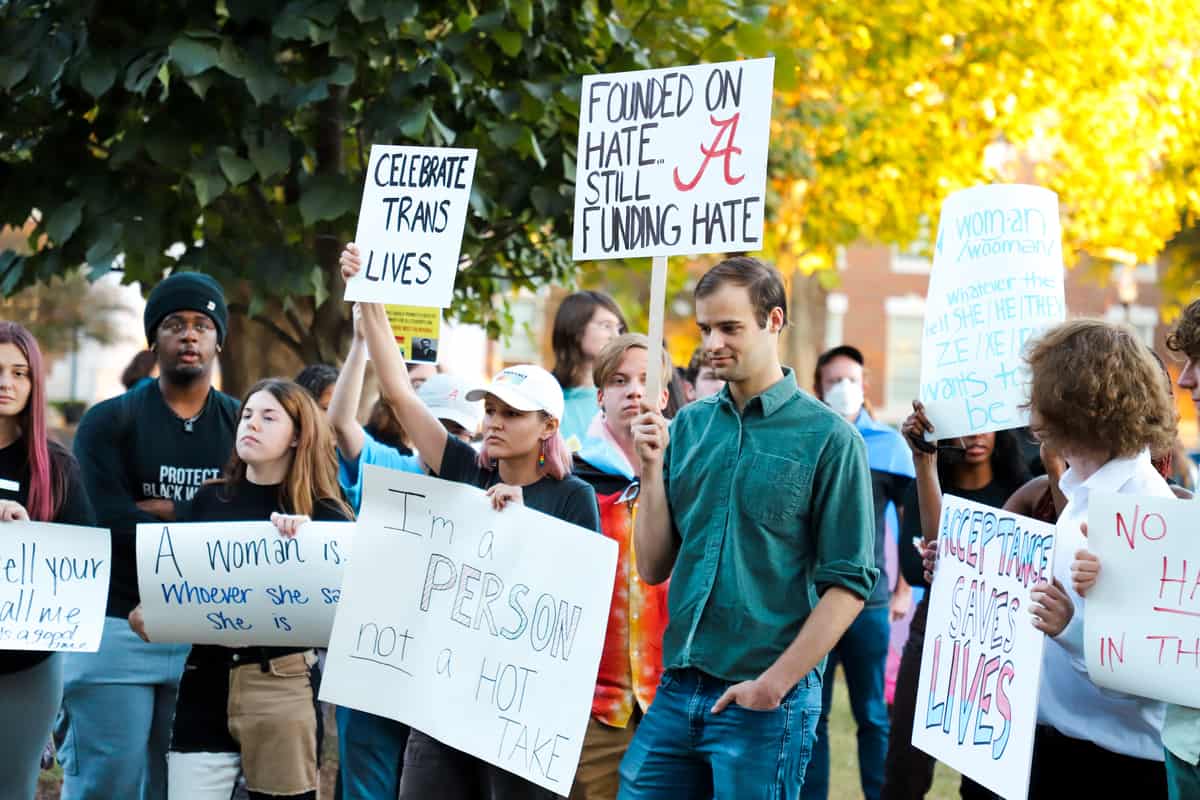In an increasingly polarized country, it is hard for students not to feel that the same polarization plagues us at The University of Alabama. It seems many of us even think it is unsafe to share our opinions, especially in the classroom.
What is especially interesting is that much of this fear seems to come from a self-perception that each of us holds a minority perspective on any given issue, with conservative students seemingly believing that the campus leans liberal and liberal students seemingly believing that the campus leans conservative.
This contradiction causes everyone, on both the right and the left, to feel more uncomfortable sharing their views than they probably should.
It cannot be ignored, however, that there is an issue with free speech on college campuses, especially at The University of Alabama. The 2024 College Free Speech Rankings conducted by the Foundation for Individual Rights and Expression and College Pulse dropped the University to 154th out of 248 colleges ranked. This was a drop from 81st in the 2022-23 report.
This same study also found that there are about 1.5 liberal students for every conservative student at the University. Although there are more liberal students overall, the University ranked 192nd in tolerance for liberal speakers and 65th in tolerance for conservative speakers.
It seems that while more people hold liberal views on campus, liberal students do not feel as comfortable as conservative students in sharing their opinions.
Those on the right often believe that suppression of free speech affects them in particular due to the increasing prevalence of diversity, equity and inclusion policies nationwide. With a University of Alabama professor citing campus-wide diversity, equity and inclusion initiatives as a reason for leaving the University, this perceived left-wing push by administrators on many campuses has catalyzed the fear that conservative students are unsafe to speak on campus.
While this fear can be justifiable, the survey from FIRE shows it is not solely a conservative phenomenon, and a fear of speaking one’s mind crosses party lines and perspectives.
The survey from FIRE also found that 67% of UA students are at least “somewhat uncomfortable” sharing their views on a “controversial political topic during an in-class discussion.” It found further that 45% of “very liberal” students and a majority of “somewhat liberal” to “very conservative” students, including “moderates,” share this fear across campuses nationwide.
Here, we see what I believe to be a bigger problem than diversity, equity and inclusion policies or a student body hostile to free speech — people have a natural tendency to think they are in an environment where it is unsafe to share their point of view.
Sometimes, this may be a problem with individual instructors or classes. However, it could also be the case that students are generally influenced by what they hear from the media, their peers and others who say they cannot openly share their views for fear of retribution.
The thought of polarization seems to have created an elevated fear of retribution for sharing one’s beliefs that, while present on some level, appears to be a bigger problem in our heads than it is in reality.
It is important to note that this perception is cross-political: Moderate, conservative and liberal students are all afraid of sharing their views. A poll by Intelligent found that around 50% of moderate, liberal and conservative students “refrain from speaking up about political or social issues in the classroom out of concern for potential consequences.”
When students across the political spectrum feel fear of speaking their minds in classrooms, there is an issue beyond one side suppressing the other.
This trend is what many political scientists call the Spiral of Silence. In general terms, this theory suggests that people fear social isolation and thus have an exaggerated fear of going against what they perceive to be the prevailing opinion in a group environment, thus causing them to feel that their perspective is in the minority and therefore not share it, preventing others who may feel the same from sharing their views.
This can present itself in settings where the person who speaks first sets the trend for how a discussion goes with others who speak after choosing to echo similar points of view and others opting to remain silent as to their actual perspective.
Simply put, there is a severe problem on college campuses: People are afraid to share their opinions on any issue that can be perceived as controversial.
However, this problem may be exacerbated by an ever-increasing belief that the state of free speech on campus is worse than it is. The only way to break out of this cycle is for students to be more open about their thoughts in class and be willing to take a risk and stand out against the perceived group belief.
There is always the chance that a group or teacher may lean against one’s opinion politically, but that is no reason to hide one’s own beliefs for fear of being shut down for one’s thoughts unless there is actual evidence of retaliation.
Ideally, professors need to be increasingly aware of any perceived bias on their part or that of the group. Instructors must work overtime to ensure students feel comfortable sharing their points of view no matter where someone may be on the political spectrum. Yes, the problem seems to be worse than it is.
However, perception is reality, and that perception needs to be changed by strong leadership from professors who set the environment in which their class exists.









